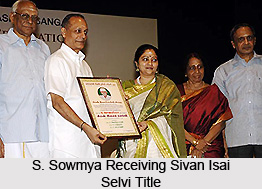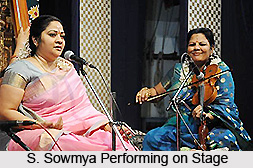 S. Sowmya is a Carnatic music singer who has been raised in a traditional South Indian family. She was trained by her father, Dr. Srinivasan, initially, but later, Sowmya learnt music from S. Ramanathan and T. Muktha. S. Sowmya being a noted performer also possesses the desire to propagate the traditions of South Indian music worldwide. Along with her friend and vocalist Shashikiran, Sowmya, in a joint effort, established an online institution, named Carnatica, devoted to instructions of classical music and dance in 1998. It also deals with archives, talent search and other activities related to Carnatic music. Eventually, Carnatica has become a popular online destination for music-related information, products, courses and discussions. Nadanubhava, the first complete reference CD of Carnatic music is also co-authored by S. Sowmya.
S. Sowmya is a Carnatic music singer who has been raised in a traditional South Indian family. She was trained by her father, Dr. Srinivasan, initially, but later, Sowmya learnt music from S. Ramanathan and T. Muktha. S. Sowmya being a noted performer also possesses the desire to propagate the traditions of South Indian music worldwide. Along with her friend and vocalist Shashikiran, Sowmya, in a joint effort, established an online institution, named Carnatica, devoted to instructions of classical music and dance in 1998. It also deals with archives, talent search and other activities related to Carnatic music. Eventually, Carnatica has become a popular online destination for music-related information, products, courses and discussions. Nadanubhava, the first complete reference CD of Carnatic music is also co-authored by S. Sowmya.
Early Life of S. Sowmya
S. Sowmya was born on April 16th, in 1969. In 1990, she completed her graduation in Chemistry and became a Gold Medallist and 2nd rank holder, from Meenakshi College, University of Madras. Sowmya did her Masters in Chemistry from Indian Institute of Technology, Chennai, in 1992. In the year 1996, S. Sowmya successfully completed her B. A. in Indian Music, from University of Madras and was the 1st rank holder. Then she did her Masters in Indian music from University of Madras in 1998. This time as well, Sowmya was the 1st rank holder and achieved a Gold Medal. To concentrate on her music, she stopped her doctoral research program at IIT.
Career of S. Sowmya
S. Sowmya has had an illustrious career through out her lifetime. She has performed in several prominent and prestigious occasions.
•World Tamil Conference, Tanjore, in 1995
•Main concert at the Radio Sangeet Sammelan, New Delhi, in 1999
•Millennium Conference of the Indian Fine Arts Society, Singapore
•Vocal support for Dr. S. Ramanathan and T. Muktha
•Gandhi Smriti Concert on Martyrs` Day, New Delhi
•Jugal Bandhi along with Pandit Ajoy Chakrabarthy, Madras Bengal Association
•South Zone Hookup and National Programmes on AIR

Other than performing on the above occasions, S. Sowmya has also conducted Lectures, demonstrations and workshops for SPIC-MACAY, YACM, Chennai, as well as for numerous universities through out the world. S. Sowmya is also the Co-author of world`s first encyclopaedic CD-ROM on Carnatic music, named Nadanubhava. Moreover she had also launched the 1st guru based on Video CD and Karaoke on Carnatic music, named Nadopasana - My Own Carnatic Tutor. S. Sowmya is also the first musician to release a Video CD album on her live concert of Mahakavi Bharatiyar songs.
Other than these, Sowmya is the Managing Director of Srishti`s Carnatica Pvt. Ltd.; Actively involved in documenting Carnatic music as Executive Trustee of Carnatica Archival Centre for Music and Dance; Producer of popular music albums (Audio and Video) under the `Carnatica` label; Coordinator of several successful events such as Raganubhava, Sahityanubhava, Layanubhava, Vadyanubhava and Natyanubhava series; Successfully organised the World Music Day on the 21st of June, 2001 involving a number of musicians; Published a number of articles in various journals in India and abroad; Proficient knowledge of Sanskrit, Hindi, Tamil, Kannada, Telugu, Malayalam and French, besides English.
Achievements of S. Sowmya
Throughout her career, S. Sowmya has received several awards like, Kshetragnar Padam Prize, in 1985; MLV Award in 1986; Pankajam Rajam Award in 1987; D.K. Pattammal Award in 1988; T.V. Subba Rao Award in 1989; Pappu Kamakshiamma Award in 1993; G. Ramakrishna Iyer Award in 1994; T. R. Rajagopala Iyer Award in 1995; Ariyakudi Trust Award in 1996; Srirangam Gopalaratnam Award (Best Lady Vocalist) in 1997; Srirangam Gopalaratnam Award in 2005.
S. Sowmya has also been conferred many accolades and titles.
•Isai Peroli, Karthik Fine Arts, in 1996
•Nada Oli, Nada Inbam, in 2001
•Rasika Kala Ratna, Rasikapriya, Australia, in 2001
•Tamil Isai Chelvi, Australian Tamil Foundation, in 2001
•Nada Bhushanam, Shanmukhananda Fine Arts, in 2002
•Asthana Vidushi, Sri Sri Sringeri Sharada Peetham, in 2003

•Vani Kala Sudhakara, Sri Thyaga Brahma Gana Sabha, in 2004
•Bala Ratna, Shri Bala Tripurasundari Peetham, in 2005
•Sangeetha Saptha Sagara, Shanthi Arts Foundation, in 2005
•Sangeetha Siromani, Nungambakkam Cultural Academy, in 2009
•Sangeetha Choodamani, Sri Krishna Gana Sabha, in 2010
•Sivan Isai Selvi, Papanasam Sivan Rasikar Sangam, in 2010
•Distinguished Alumnus, Indian Institute of Technology Madras, in 2011
•Sangeetha Kala Sarathy, Sri Parthasarathy Swami Sabha, 2011
•Vidhya Tapasvi, TAPAS Cultural Foundation, Chennai, 2012




















